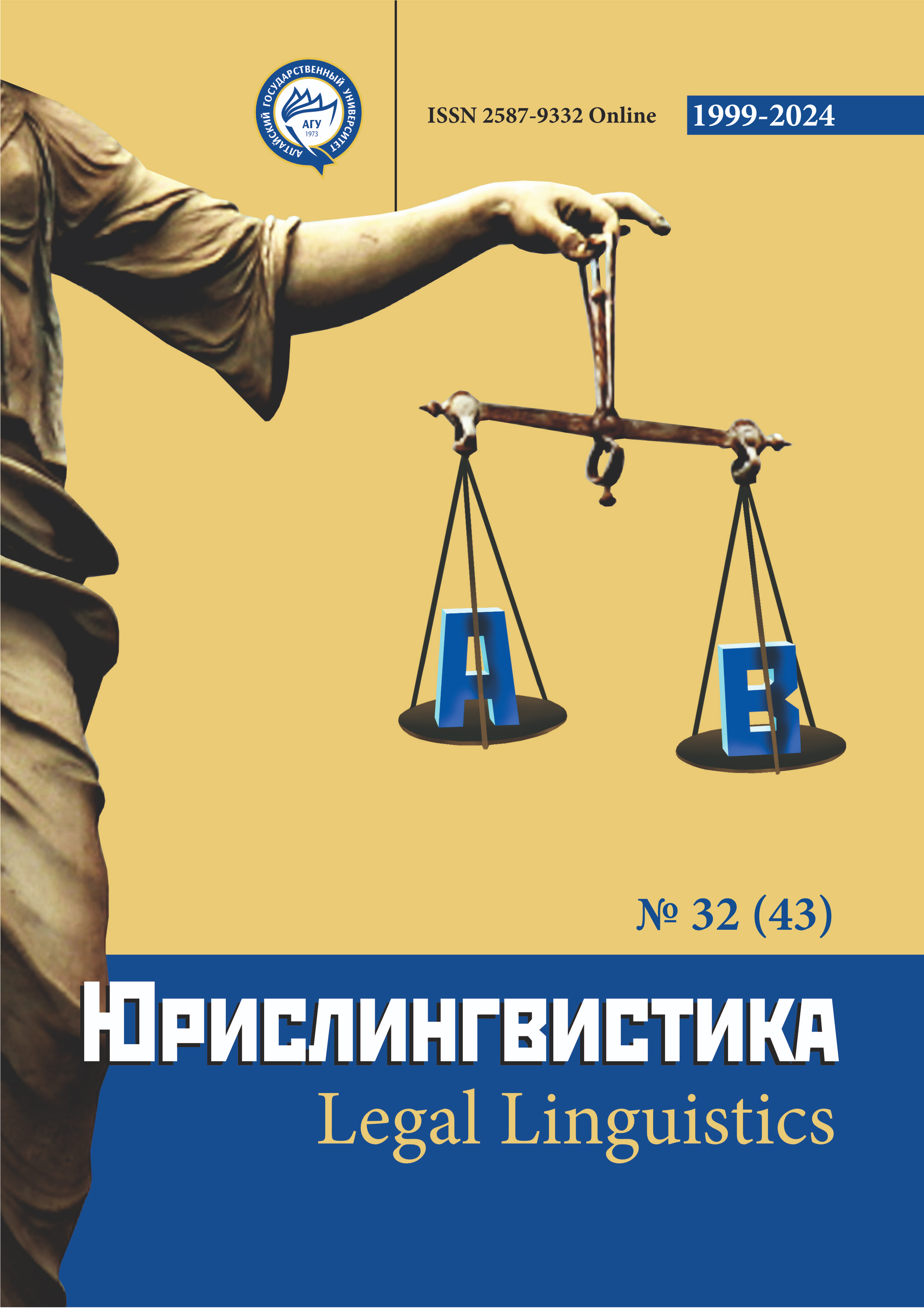On the Profession of Court Interpreter in Russia
УДК 81.25, ББК 81.1
Abstract
In this article court interpreting is considered as the provision of court interpreting services from Russian or any other language of legal proceedings of the republics of the Russian Federation, into indigenous languages, as well as from indigenous languages – into the languages of legal proceedings of the Russian Federation, performed on indemnity basis by a private entity, duly included in the Unified Federal Register of Court Interpreters, to courts, law enforcement agencies and other persons involved in the process, in order to secure the constitutional right of an individual and a citizen of the Russian Federation to use their mother tongue or freely choose a language of communication in court. The authors emphasize that the profession of "court interpreter" is not enshrined in law, and there is no institution of special sworn interpreters. The performance in court is carried out by polymath linguists who know special terminology and technologies of text processing in oral and written forms, including interlingual interpreting. At the same time, there is no unified certification system to verify professional skills. There is no unified federal register of court interpreters, the project has not been fulfilled yet. Any text processed in accordance with the current norms and used for legal ruling passes not only the phase of translation, but also of unified registration and subsequent legalization. In this regard, the problem of insufficient legal framework in judicial translation has been raised. The article discusses professional requirements for legal interpreters along with quality requirements and the scope of their professional training in the Russian Federation.
Downloads
Metrics
References
Бородина А. В. Нотариальный перевод в свете проблематики юридического перевода: исторический контекст и современные проблемы / Вестник ТвГУ. Серия "Филология". - 2019. - № 4 (63). - С. 225–232.
Коробова Е. А. Специфика защитительной речи в зеркале перевода / Вестник Московского университета. Серия 22. Теория перевода. - 2021. - № 3. - С. 150–161
Левитан К. М. Юридический перевод: основы теории и практики. Учебное пособие. М., 2014.
Спектор Л. А. Заведомо ложные показание, заключение эксперта, специалиста или неправильный перевод как препятствие осуществления правосудия / Пробелы в российском законодательстве. - 2009. - № 4. - С. 284-287.
Кодекс административного судопроизводства Российской Федерации от 08.03.2015 N 21-ФЗ (ред. от 17.02.2023) КАС РФ Статья 52. Переводчик.
Vasilenko L. Yu. Professionalization of court interpreting / Вестник РУДН. Серия: Юридические науки. - 2013. - № 4. – С. 332-336.
Дриц К. В. Институт сертификации судебных переводчиков: зарубежный опыт и возможность его применения в России / Юридический вестник молодых ученых. - 2016. - № 3. URL: https://cyberleninka.ru/article/n/institut-sertifikatsii-sudebnyh-perevodchikov-zarubezhnyy-opyt-i-vozmozhnost-ego-primeneniya-v-rossii (дата обращения: 17.03.2023).
Калиниченко Т. Г. Соотношение переводческой и нотариальной деятельности / Федеральная нотариальная палата URL: https://notariat.ru/ru-ru/publishing-center/author/-sootnoshenie-perevodcheskoj-i-notarialnoj-deyatelnosti/ (дата обращения: 05.04.2023).
Обидина Л. Б. Культура судебного перевода: проблемы практики / Юридическая техника. 2016. №10. URL: https://cyberleninka.ru/article/n/kultura-sudebnogo-perevoda-problemy-praktiki (дата обращения: 05.05.2023).
ГПК РФ. Раздел II. Производство в суде первой инстанции. Глава 15. Судебное разбирательство. Статья 162. Разъяснение переводчику его прав и обязанностей.
УК РФ. Статья 307. Заведомо ложные показание, заключение эксперта, специалиста или неправильный перевод.
Профессиональный стандарт «Специалист в области перевода». URL: https://docs.cntd.ru/document/603354689 (дата обращения: 04.03.2023).
Союз переводчиков России предложил институализировать в России судебный (присяжный) перевод. URL: https://edu.garant.ru/relevant/main/1402680/ (дата обращения: 03.03.2023).
Щербинина И. В., Александрова Е. М. К вопросу об ответственности судебного переводчика за непреднамеренный неправильный перевод / Legal Bulletin. - 2021. - №1. URL: https://cyberleninka.ru/article/n/k-voprosu-ob-otvetstvennosti-sudebnogo-perevodchika-za-neprednamerennyy-nepravilnyy-perevod (дата обращения: 21.05.2023).
Федеральный закон "О лицензировании отдельных видов деятельности" от 04.05.2011 N 99-ФЗ.
Этический кодекс переводчика. URL: https://translation-ethics.ru/code/ (дата обращения: 05.03.2023).
Legal Interpreting – Definition and Context. URL: https://knowledge-centre-interpretation.education.ec.europa.eu/en/legal-interpretation/legal-interpreting-definition-and-context (дата обращения: 04.05.2023).
Copyright (c) 2024 Елена Глушко, Пронина Елена, Эльмира Мусаева, Альбина Гисматуллина

This work is licensed under a Creative Commons Attribution 4.0 International License.
The authors, which are published in this journal, agree to the following conditions:
1. Authors retain the copyright to the work and transfer to the journal the right of the first publication along with the work, at the same time licensing it under the terms of the Creative Commons Attribution License, which allows others to distribute this work with the obligatory indication of the authorship of this work and a link to the original publication in this journal .
2. The authors retain the right to enter into separate, additional contractual agreements for the non-exclusive distribution of the version of the work published by this journal (for example, to place it in the university depository or to publish it in a book), with reference to the original publication in this journal.
3. Authors are allowed to post their work on the Internet (for example, in a university repository or on their personal website) before and during the review process of this journal, as this may lead to a productive discussion, as well as more links to this published work (See The Effect of Open Access).











